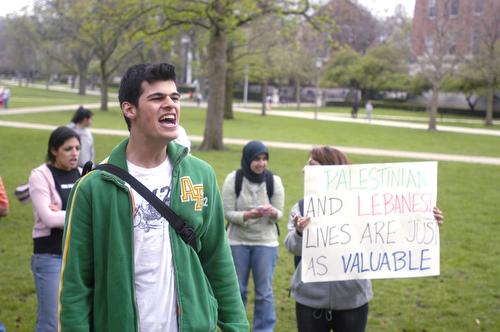Israeli-Palestinian issues divide students, campus

April 27, 2007
Many students have heard of the infamous Israeli-Palestinian conflict in the Middle East, but still may not be aware of how close it hits home.
From the creation of multiple Facebook groups regarding the conflict to a number of Registered Student Organizations, University students are proactive in educating the public on the issue from both sides.
On Wednesday, the Illinois-Israel Public Affairs Committee, commonly known as IlliniPAC, hosted the celebration of Israel’s 59th birthday on the Quad and provided food and entertainment.
However, a handful of protesters stood close by holding posters declaring “Free Palestine” and “Stop U.S. Aid to Israel.”
Eli Wald, senior in LAS and former president of IlliniPAC, said the protesters were entitled to their opinions.
Get The Daily Illini in your inbox!
“It really didn’t bother me at all,” Wald said. “Today was about what a beautiful, vibrant country Israel is.”
In 1948, after World War II, the Jewish population wanted a mandate and created the state of Israel without the Palestinian Arabs’ consent, said Lina El-Beshbeeshy, junior in Engineering and president of the Arab Student Association.
As a result, the conflict has created a Palestinian refugee problem, she added.
According to the United Nations Relief and Works Agency Web site, the number of Palestinian refugees has grown from 914,000 in 1950 to more than 4.3 million in 2005, making one in three Palestinians a refugee.
Rami Abuhabsah is a Palestinian refugee himself. The sophomore in LAS and former president of Students for Justice in Palestine said his parents were displaced in 1948 under the violence of Israeli soldiers. As one of the protesters on the Quad, he said his goal was to educate students about the violence that occurred in 1948.
“They lost everything essentially; they took everything,” Abuhabsah said.
Steven Slivnick, junior in LAS and president of IlliniPAC, said student organizations reflect students’ passions concerning the conflict. IlliniPAC supports and celebrates Israeli culture and heritage, he added.
“We support Israel and its right to exist and its right to exist in peace,” Slivnick said.
Slivnick said he believes the Palestinian people have been poorly led by leaders who have chosen a path of violence and terrorism rather than attempting to establish peace.
“The Palestinian leadership is most interested in launching terror attacks against Israel than providing the basic services that its citizens desperately need,” Slivnick said.
El-Beshbeeshy said the Israelis erected a 25-foot wall with the intent of protecting themselves from the violent acts of Palestinians, but instead, she believes the numbers of bombings have increased.
The conflict in Palestine has lasted for over 60 years and the deaths of thousands of Palestinians have not been accounted for while Israeli soldiers are being mourned, she said.
“They’re still humans and still have the right to have lives and exist,” El-Beshbeeshy said. “The media portray Palestinians in a bad way.”
El-Beshbeeshy and Abuhabsah said they both feel insulted when people label them as anti-Semitic.
“It’s not a hatred or animosity (toward the other race); it’s just hatred against the occupation itself,” El-Beshbeeshy said.
Despite the disparity in opinions regarding the conflict, Slivnick said the atmosphere on campus is a civil one.
However, Abuhabsah said animosity is evident during some events where insults were directed towards him and fellow pro-Palestinian students.
“We get really scared to be politically active, they intimidate us,” Abuhabsah said. “I don’t want any form of terrorism. I truly want peace.”
Wald said everyone feels passionately about the issue, but he is there to enhance the understanding of Israel and the conflict itself.
“It’s very painful for both sides,” said Yonatan Lapid, Israel programs coordinator of the Hillel Foundation. “I hope that one day we’ll be able to live in peace together.”






